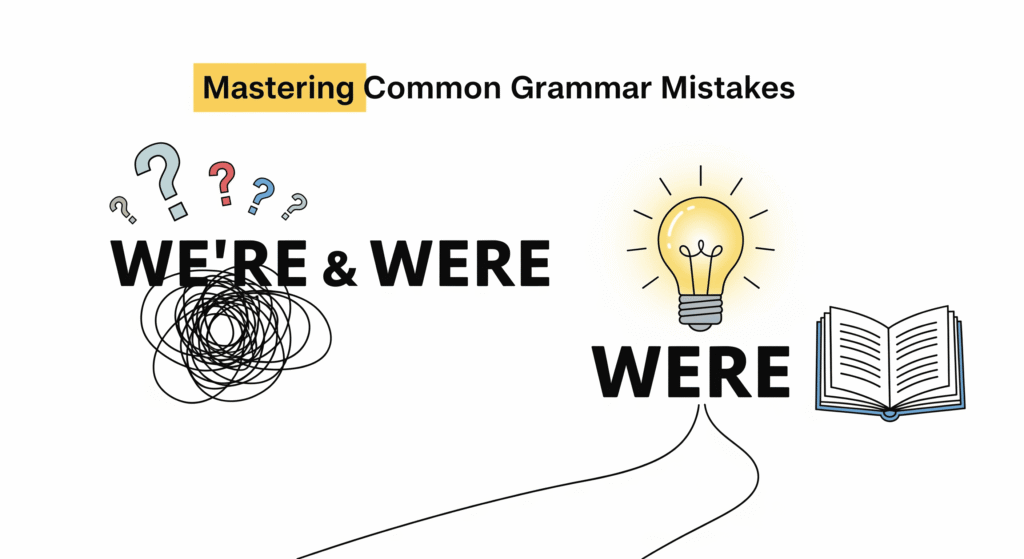Understanding the difference between “we’re” and “were” is important. These words are commonly confused in writing.
They sound alike but have different meanings. “We’re” is a contraction of “we are. ” It’s used to describe what a group is doing. “Were” is the past tense of “are” and shows past actions or states. Grasping the difference helps in writing clear and correct sentences.
Many people mix them up, leading to confusion. In this blog, we’ll explore their meanings, uses, and examples. By the end, you’ll have a better grasp of when to use “we’re” and “were” accurately. This will improve your writing skills and help you communicate more effectively.
Common Grammar Mistakes
Good grammar is very important. It makes your writing clear. It helps people understand your message. Mistakes can confuse readers. They might not understand you. This can be a big problem, especially in business.
Many people mix up we’re and were. They sound similar. But they have different meanings. “We’re” means “we are.” “Were” is the past tense of “are.” Using them wrong can change the meaning of a sentence. Always check your work.

We’re Vs Were
We’re is a short form of “we are.” It means the same as “we are.” Were is a past tense word. It shows something happened before now.
We’re going to the park today. Were you at the park yesterday? They were happy at the party. We’re friends forever.
Identifying We’re
We’re is a short form of ‘we are’. It helps make speech faster. Always remember, we’re means ‘we are’.
Here are some examples:
- We’re going to the park.
- We’re happy to help you.
- We’re excited for the trip.
Each sentence can be expanded. For example, “We are going to the park.” This helps in checking. If the sentence makes sense, then we’re is correct.

Identifying Were
“Were” is the past tense of “are”. It is used with plural subjects. For example, “They were happy”. This means they were happy in the past.
Here are some examples:
- We were at the park.
- They were friends.
- Those books were interesting.
Common Confusions
We’re and were sound alike but mean different things. We’re is short for “we are”. Were shows past actions or states. They can confuse many people.
Use context to know which word fits best. “We’re going to the park.” This means “we are”. “They were happy.” This means in the past. Practice helps to learn the right usage.
Tips For Mastery
Complete these sentences with “we’re” or “were”.
- Yesterday, we __ at the park.
- Today, __ going to the zoo.
- Last year, we __ best friends.
- Right now, __ very happy.
Check your answers. Read the sentences out loud. Hear the difference. Repeat daily for best results.
Remember, “we’re” means “we are”. Use it for the present. “Were” is for the past. Try this: “We’re eating.” and “We were there.” Simple, right?
Real-world Applications
We’re means we are. Were is a past tense verb. Use we’re in present tense. Use were in past tense. For example, “We’re going to the park.” And “We were at the park.”
Check your sentences. Replace we’re with we are. Does it make sense? Use were if talking about the past. This helps avoid mistakes. Practice makes perfect.
When speaking, say we are for we’re. Use were when talking about past events. For example, “We’re happy today.” And “We were happy yesterday.”
Listen to others. Notice how they use we’re and were. Try to copy their use. This helps improve your speaking. Keep practicing.
Resources For Improvement
Online tools can help improve grammar. Websites like Grammarly and Hemingway Editor are great. They point out mistakes. They also offer suggestions. Use these tools to learn faster. They are easy to use. Just copy and paste your text. The tools do the rest.
Grammar guides are useful for learning. Websites like Purdue OWL and Grammarly have guides. They explain rules in simple terms. You can learn at your own pace. These guides cover many topics. They are free to use.

Conclusion
Understanding the difference between “we’re” and “were” is crucial. It helps in clearer communication. “We’re” means “we are. ” “Were” is a past tense verb. Mixing them up can confuse readers. Practice using them correctly in sentences. Improve your writing skills with this knowledge.
Keep learning and practicing. Better writing leads to better understanding. It’s simple. It’s effective. You got this!

